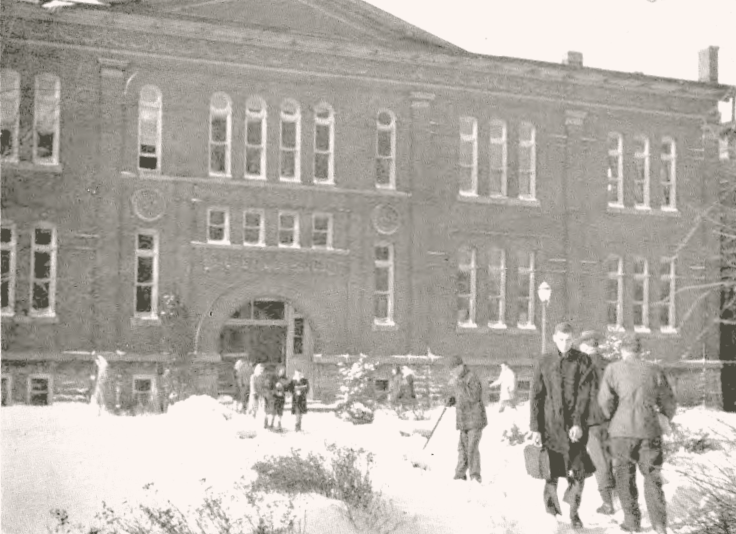O. P. Kretzmann, President, Valparaiso University. 1945.
This story was originally published in The Vidette-Messenger of Porter County on December 24, 1945.
Tonight at dusk snow was falling on Valparaiso….Driven almost horizontally by a wind from the north, it whirled through the cone of light thrown by the lamp across the street, from darkness to darkness….On the edge of town, where the road crosses the railroad tracks, the shocks of corn which I had seen brown in October were now white on the side toward the wind….At this hour every day as night falls over Valparaiso, the air is alive with the moan of out mainline trains rushing towards New York…. These are the last romantic sounds of our clattering age, the only sounds which still remind us of time and distance….All day Valparaiso has gone about its work...Later it will sleep….Just now, in this hour between day and night, it is joined for a moment to the city eight hundred miles toward the rising sun and beyond it to Europe, where soon it will be drawn, to the world beyond the end of the rails and the beginning of the sea, where men do not like snow this year, because there is no coal and no warmth anywhere….But here now the wind and the trains make a solemn concert, and the hills are reverent in silence. If I stand close to this tree and raise my collar against the wind, I can think for a while about Christmas….
The Christmas of childhood….I remember that we were very happy then because, for all we know, there was nothing in the world but happiness…. There was kindness everywhere, as far as we could see, and the snow and the lighted trees and the bright ribbons and the piles of oranges and candies in the shop windows were the natural accompaniment of our joy―We had a crib under the Christmas tree, and there, every year, forever young, forever fair, the Child lay in the manager, the shepherds knelt adoring, and the kings were coming over the canvas hill from the east….It was natural that they should come every year….We knew as only children can know that they had never been far away…. They were very real, these shepherds and kings in clay, far more real than the strange, mad world which began to loom before us in the headlines we were beginning to read….We did not know that beyond the carols, the lights, and the snow there were many to whom these things meant only a new loneliness―the loneliness of being shut out from a brightly lighted house…. We did not know that the full measure of the world’s unhappiness can be seen clearly only in the light of Christmas….Bethlehem, the manger, the mother, the Child under our tree!....Bedlam, hate, fear, hunger under the stars!....Year by year the world stood more solidly against the light of Christmas and cast deeper shadows….
The sound of the wind in the telephone wires rises to a higher note….Now, as dusk falls over Valparaiso, I know that we must look into the uncertain year with courage and hope….I have no room and no sympathy for easy optimism now at Christmas…. We were and are alone, children of the dust, visitors in time and strangers in eternity…. Yet we are also the children of hope…. If this were not true, there would have been no need for a first Christmas or 1,900 since then…. There were soldiers then and wars we have forgotten and fear and pain…. The world was what it is, men were what we are, and it was for a world like this and men like us that Christ was born in Bethlehem…. So, as night comes down, the darkness drives away the years, and Bethlehem and the twentieth century become parts of the same divine plan, point and counterpoint, strophe and antistrophe….One momentary, the other eternal….Our lighted trees will be out bonfires in the dark, the answer of our loneliness and our faith to the star that came and stood over the place where the young Child lay….A prayer for the night to the Child on Christmas eve:
Be close. Be with me. Hush the day’s last cries
That echo in my ear.
Put out the light that glitters in my eyes;
The night is here.
Quiet my hands, restless and quivering,
Quench the last tear I weep,
Dismiss my voice, blow out my breath, and sing
My heart to sleep.
―O.P. Kretzmann, President, Valparaiso Univ.
The aftermath of snow on the old campus at Valparaiso University. 1945.


